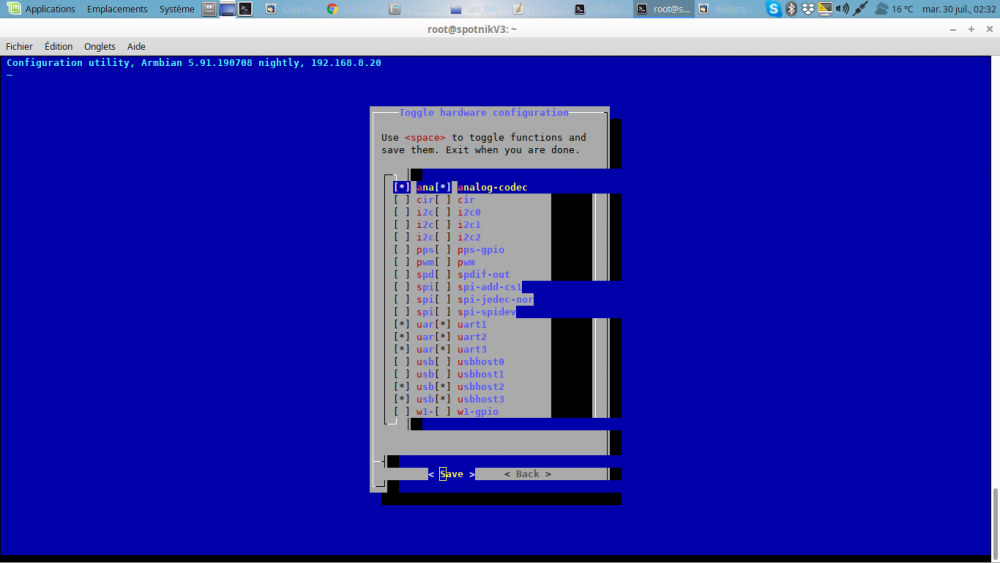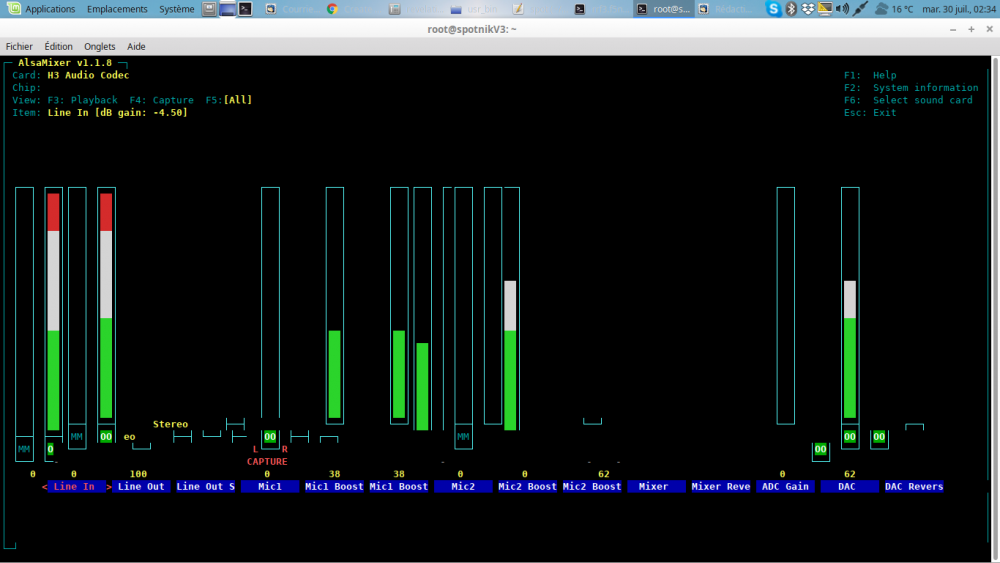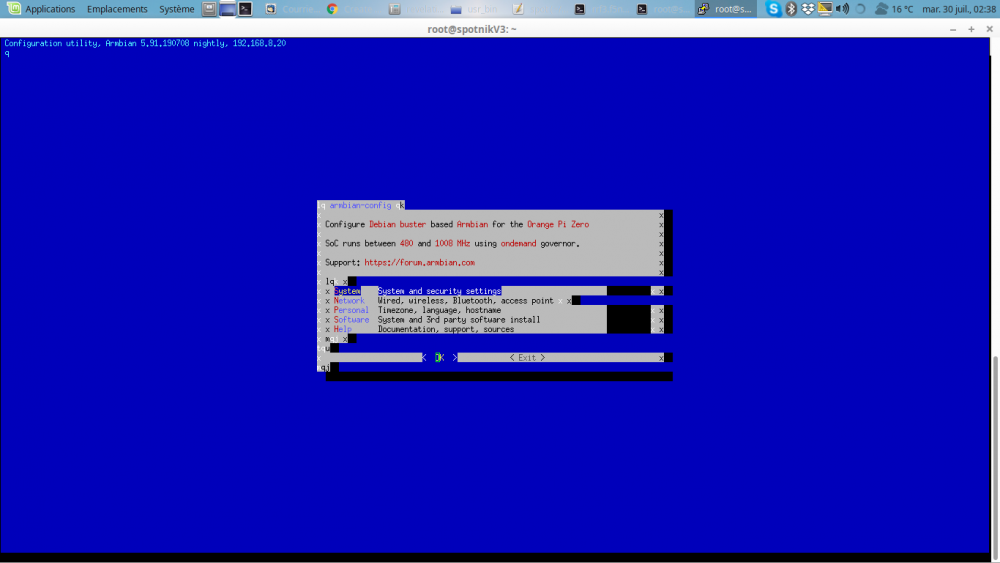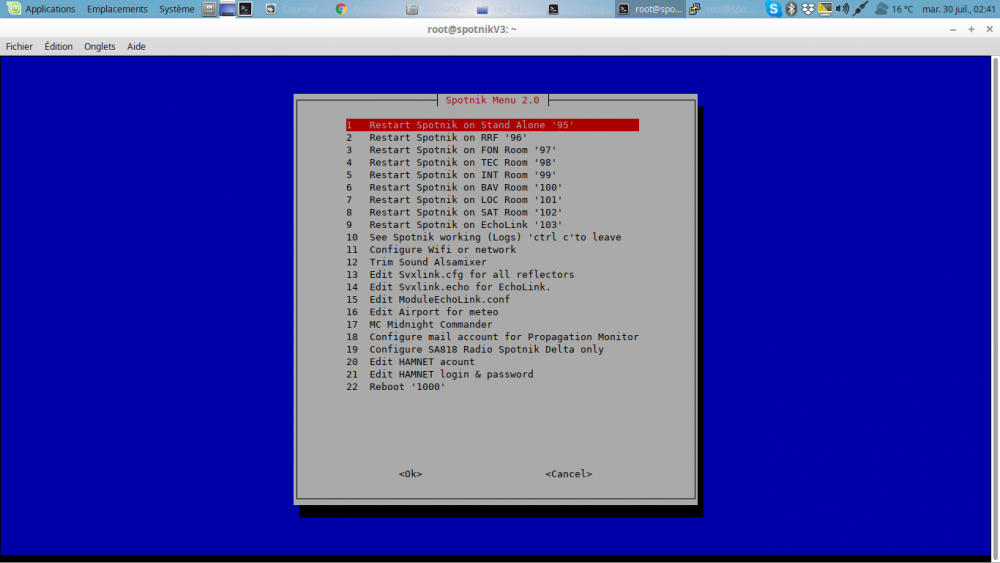Search the Community
Showing results for tags 'orangepizero'.
-
Hi, I bought a 3.5 inch RPi LCD display from here: https://www.aliexpress.com/item/32965280840.html?spm=a2g0s.9042311.0.0.2a474c4dxALiQy I connected the display straight to my Orange Pi zero board. The slot on the Orange Pi Zero is flipped compared to RPi so the LCD display goes outside the board. I guess that is the right way to connect. Anyway, when I power on the board I can see illuminated screen. The problem is that everything I have tried to configure the LCD was unsuccessful. I am trying with the Armbian image mentioned in this web site: http://www.orangepi.org/orangepibbsen/forum.php?mod=viewthread&tid=3773 (Armbian_5.35_Orangepizero_Ubuntu_xenial_default_3.4.113.7z). When I execute the command "modprobe fbtft_device custom name=fb_ili9486 gpios=dc:18,reset:2 speed=16000000 busnum=1 rotate=270", I can see a new device /dev/fb8 but then "con2fbmap 1 8" does nothing - just the same blank illuminated screen. I also tried with various settings for "dc" and "reset" based on what I found on the forums. Any idea if this device is supported on Orange Pi Zero? Also what can I do to troubleshoot the problem further? Thanks!
-
Hello everyone, I know this is a well known problem of the OPi Zero, but in regarding to "solutions": h3consumption works only with the legacy kernel because of the use of Fex Is there a way to tweak the things h3consumption did in the mainline version? In the mainline version from armbian-config it is possible to disable USB, in /etc/default/cpufrequtils it is also possible to set the maximum frequency and wifi can be disabled. Does anyone know any option for disabling the GPU, limit the DRAM clockspeed and the maximum active cores? Is the only possibility to recompile the kernel, at the moment? Unfortunately the main tutorial about h3consumption is no longer available
-
I have an orangepizero (https://www.armbian.com/wp-content/uploads/2018/02/orangepizero.png) I installed Armbian_5.90_Orangepizero_Ubuntu_bionic_next_4.19.57.7z on 32GB sd. The pi0 is powered via pin with a 5V/5A power supply, norflash mx25l1606e. The HDD is a new working 80gb maxtor powered by an external USB 2.0 box. I have also connected the serial and read the boot information. I used armbian-config and transferred armbian to HDD and it works, but I have to keep the miniSD plugged in. I ask you can boot from HDD and not use any SD? PS I read almost all posts here on the forum and tried the old procedures but it does not work.
-
I have installed the most current Armbian Bionic to a Orange PI zero (512MB). I can't record anything from microphone, as the recording process just hangs forver (blocks). arecord -l gives the following output: **** List of CAPTURE Hardware Devices **** card 0: Codec [H3 Audio Codec], device 0: CDC PCM Codec-0 [] Subdevices: 1/1 Subdevice #0: subdevice #0 arecord -d2 test.wav gives the following output, but hangs till killed with Ctrl-C Recording WAVE 'test.wav' : Unsigned 8 bit, Rate 8000 Hz, Mono ffmpeg -f alsa -i hw:0 -t 5 test1.wav gives the following output, and hangs as well forever: ffmpeg version 3.4.6-0ubuntu0.18.04.1 Copyright (c) 2000-2019 the FFmpeg developers built with gcc 7 (Ubuntu/Linaro 7.3.0-16ubuntu3) configuration: --prefix=/usr --extra-version=0ubuntu0.18.04.1 --toolchain=hardened --libdir=/usr/lib/arm-linux-gnueabihf --incdir=/usr/include/arm-linux-gnueabihf --enable-gpl --disable-stripping --enable-avresample --enable-avisynth --enable-gnutls --enable-ladspa --enable-libass --enable-libbluray --enable-libbs2b --enable-libcaca --enable-libcdio --enable-libflite --enable-libfontconfig --enable-libfreetype --enable-libfribidi --enable-libgme --enable-libgsm --enable-libmp3lame --enable-libmysofa --enable-libopenjpeg --enable-libopenmpt --enable-libopus --enable-libpulse --enable-librubberband --enable-librsvg --enable-libshine --enable-libsnappy --enable-libsoxr --enable-libspeex --enable-libssh --enable-libtheora --enable-libtwolame --enable-libvorbis --enable-libvpx --enable-libwavpack --enable-libwebp --enable-libx265 --enable-libxml2 --enable-libxvid --enable-libzmq --enable-libzvbi --enable-omx --enable-openal --enable-opengl --enable-sdl2 --enable-libdc1394 --enable-libdrm --enable-libiec61883 --enable-chromaprint --enable-frei0r --enable-libopencv --enable-libx264 --enable-shared libavutil 55. 78.100 / 55. 78.100 libavcodec 57.107.100 / 57.107.100 libavformat 57. 83.100 / 57. 83.100 libavdevice 57. 10.100 / 57. 10.100 libavfilter 6.107.100 / 6.107.100 libavresample 3. 7. 0 / 3. 7. 0 libswscale 4. 8.100 / 4. 8.100 libswresample 2. 9.100 / 2. 9.100 libpostproc 54. 7.100 / 54. 7.100 So I am currently clueless, what to do next. Thanks for any further hints!
-
root@orangepizero:/boot# iptables -nL modprobe: ERROR: ../libkmod/libkmod.c:586 kmod_search_moddep() could not open moddep file '/lib/modules/4.14.14-sunxi/modules.dep.bin' modprobe: FATAL: Module ip_tables not found in directory /lib/modules/4.14.14-sunxi iptables v1.6.0: can't initialize iptables table `filter': Table does not exist (do you need to insmod?) Perhaps iptables or your kernel needs to be upgraded. root@orangepizero:/boot# uname -a Linux orangepizero 4.14.14-sunxi #1 SMP Thu Jan 25 12:20:57 CET 2018 armv7l armv7l armv7l GNU/Linux root@orangepizero:/boot# Can someone help me how to fix this issue on Orange Pi Zero - 512 MB board ? I am running Armbian Ubuntu server image. Thank you in advance.
-
How enable tv out on mainline kernel 4.19? script.bin not found and stevenj/h3-tve not working on my version of kernel.
-
Hi everyone, I am using nmtui to setup static ip both eth0 and wlan0 on orange pi zero. It works fine if only one of them was activated I want to use both. If LAN cable was be connected into pi, the board is run on ethernet. On other side, run on wifi when the cable was pluged out When I rebooted the pi without LAN cable, the eth0 auto activated lead to I can't access the module via wifi even though it is connected successful. I must connect via serial and disable eth0 after that I connected via wifi.
-
Hi, I have a Opi zero 512 and did a fresh install Debian Buster with Armbian Linux 4.19.59-sunxi I installes the Linux-Kernel but I run into problems with compiling a driver. outdoorpi@orangepizero:~/usb-redirector-linux-armeb-gnueabihf/files/modules/src/tusbd$ sudo make KERNELDIR=/usr/src/linux-source-4.19.57-sunxi64 make -C /usr/src/linux-source-4.19.57-sunxi64 M=/home/outdoorpi/usb-redirector-linux-armeb-gnueabihf/files/modules/src/tusbd modules make[1]: Entering directory '/usr/src/linux-source-4.19.57-sunxi64' CC [M] /home/outdoorpi/usb-redirector-linux-armeb-gnueabihf/files/modules/src/tusbd/driver.o /bin/sh: 1: scripts/basic/fixdep: Exec format error make[2]: *** [scripts/Makefile.build:304: /home/outdoorpi/usb-redirector-linux-armeb-gnueabihf/files/modules/src/tusbd/driver.o] Error 2 make[2]: *** Deleting file '/home/outdoorpi/usb-redirector-linux-armeb-gnueabihf/files/modules/src/tusbd/driver.o' make[1]: *** [Makefile:1517: _module_/home/outdoorpi/usb-redirector-linux-armeb-gnueabihf/files/modules/src/tusbd] Error 2 make[1]: Leaving directory '/usr/src/linux-source-4.19.57-sunxi64' make: *** [Makefile:61: default] Error 2 outdoorpi@orangepizero:~/usb-redirector-linux-armeb-gnueabihf/files/modules/src/tusbd$ it seems to be a problem with cross compiling but how to solve it?
-
Hi, i have a problem with my two Orange Pi Zero´s The Orange Pi Zero´s are installed with the latest Armbian_5.59_Orangepizero_Ubuntu_xenial_default_3.4.113 Both Opis are only connected to 5V2A over the microUSB Port and the LAN Port (not WLAN) and use a recommended Sandisk 16GB microSD Card. Both Pi´s are not reachable over SSH maybe 15 Minutes after boot. Direct after the boot SSH is working. Other Services like ping and the installed snmp deamon are working pretty well. Only SSH access stops working after maybe 15 Minutes. There is nothing connected to the OPIS. Is there a known problem with SSH deamon? Greets and thx for help Stoffel
-
Hello, is the new Orange pi Zero LTS supported by Armbian? It's the same chip and same stuff but they claim they have reduced the power consumption and lower the board’s temperature. Do you think they have archived that by manipulating the hardware or by lowering the frequency and stuff via software?
-
Hello, Is there any conclusion how to het wifi to work on OPi zero? I am on buster. I have disabled wlan power management (at least ifconfig says that "Power Management:off"), I have changed to performance governor, but still. After some period (like 5-20 mins) it drop all connections and become unresponsive (you can't even ping) for some time, and then work again. For short time again. What is really strange, as some point I was able to ping some external hosts from OPi (from session over serial) and at the same time, I could not ping OPi from my laptop. Once I tried to ping my laptop from OPi, then immediately my laptop started to ping OPi. It looks like it also refuses to respond to ARP requests. But not only.
-
Hello, When configuring I2C ports in armbian-config it shows 3 I2C ports (i2c0,i2c1,i2c2). The pinout from http://linux-sunxi.org/Xunlong_Orange_Pi_Zero shows only 2 I2C ports: 3 TWI0_SDA / PA12 / GPIO12 5 TWI0_SCK / PA11 / GPIO11 and 16 TWI1-SDA / PA19 / GPIO19 18 TWI1-SCK / PA18 / GPIO18 are there 3 or only 2 I2C ports ? (how to configure the third if there is one ?) thanks for your answers Jean Antoine
-
verry bad screen with armbian-config and alsamixer using ( lxterminal, mate terminal, putty on Linux mint Buster ) works better with xterm , on previous armbian version Jessie or stretch it's fine with all terminals . 2 first screenshoot are made on lxterminal , third on putty . the 4th one is my dialog menu and it's ok on all terminals
-
Hi All , i just tried stretch and buster there is a problem with PA10 configured "IN" problem seems to be on kernel > 4 old method for GPIO works perfectly , i have read that FEX is no longer availlable on 4.X kernel . PA10 il also used by SPI ( pin 1) . SPI is not enable on /boot/ArmbianEnv.txt. this script works perfectly on 3.x kernel but crashed GPIO 10 and GPIO 7 on 4.x kernel , when PA10 configured in "INPUT" and receive a +3.3V it crashed and seems to stay up indefinitively nothink on logs , PA7 can't become up in OUT mode i think there is a problem with SPI and GPIO on 4.X kernel I can't change GPIO pin on my project due to addon hardware cards i made ... (https://f5nlg.wordpress.com/category/hotspot/) sorry it's in French ... I tried on Jessy works perfectly as expected , on Stretch doesn't work , on Buster doesn't work ( Armbian monitor & alsamixer is not workink as expected on BUSTER via SSH it's awfull both are dificult to see on screen ) # Radio 1 (VHF) GPIO 7:PTT - GPIO 10:SQULECH echo "7" > /sys/class/gpio/export & sleep 2 echo out > /sys/class/gpio/gpio7/direction # Squelch echo "10" > /sys/class/gpio/export & sleep 2 echo in > /sys/class/gpio/gpio10/direction same software and version is used on jessy and stretch or buster ( compiled from sources ) SVXLINK from SMOSVX ( https://github.com/sm0svx/svxlink ) any idea ? solutions ? thanks in advance. Jean-Philippe , F5NLG
-
ARMBIAN 5.75 stable Ubuntu 18.04.2 LTS 4.19.38-sunxi Orange Pi Zero Board Please refer armbianmonitor.log for armbianmonitor -U command output details I have configured My Orange Pi Zero onboard wlan chip (xradio_wlan driver) to work on both Ap mode and Client modes simultaneously. When both Ap and Client interfaces are up and working, and when the connected wifi channel of the Client interface changes, kernel hang occurs. Error message [20148.872296] rcu: INFO: rcu_sched self-detected stall on CPU [20148.877893] rcu: 1-....: (4945709 ticks this GP) idle=8aa/1/0x40000002 softirq=9640/9640 fqs=2447771 [20148.887182] rcu: (t=4967445 jiffies g=15521 q=274313) [20148.892407] NMI backtrace for cpu 1 [20148.895897] CPU: 1 PID: 396 Comm: xradio_bh Tainted: G D W 4.19.20-sunxi #5.75 [20148.904234] Hardware name: Allwinner sun8i Family [20148.908959] [<c010dbbd>] (unwind_backtrace) from [<c010a7b1>] (show_stack+0x11/0x14) [20148.916701] [<c010a7b1>] (show_stack) from [<c08c8dc1>] (dump_stack+0x69/0x78) [20148.923921] [<c08c8dc1>] (dump_stack) from [<c08cd03b>] (nmi_cpu_backtrace+0x8f/0x90) [20148.931746] [<c08cd03b>] (nmi_cpu_backtrace) from [<c08cd0eb>] (nmi_trigger_cpumask_backtrace+0xaf/0xe0) [20148.941216] [<c08cd0eb>] (nmi_trigger_cpumask_backtrace) from [<c016c183>] (rcu_dump_cpu_stacks+0x7b/0x98) [20148.950861] [<c016c183>] (rcu_dump_cpu_stacks) from [<c016b7b1>] (rcu_check_callbacks+0x4f5/0x6c8) [20148.959815] [<c016b7b1>] (rcu_check_callbacks) from [<c0170af3>] (update_process_times+0x2b/0x48) [20148.968681] [<c0170af3>] (update_process_times) from [<c017e96b>] (tick_sched_timer+0x37/0x74) [20148.977277] [<c017e96b>] (tick_sched_timer) from [<c0171355>] (__hrtimer_run_queues+0x105/0x254) [20148.986055] [<c0171355>] (__hrtimer_run_queues) from [<c0171e15>] (hrtimer_interrupt+0xb5/0x200) [20148.994835] [<c0171e15>] (hrtimer_interrupt) from [<c0780ab1>] (arch_timer_handler_phys+0x25/0x28) [20149.003787] [<c0780ab1>] (arch_timer_handler_phys) from [<c0162d9b>] (handle_percpu_devid_irq+0x57/0x19c) [20149.013346] [<c0162d9b>] (handle_percpu_devid_irq) from [<c015f1f5>] (generic_handle_irq+0x1d/0x28) [20149.022383] [<c015f1f5>] (generic_handle_irq) from [<c015f695>] (__handle_domain_irq+0x45/0x84) [20149.031076] [<c015f695>] (__handle_domain_irq) from [<c059a475>] (gic_handle_irq+0x39/0x68) [20149.039421] [<c059a475>] (gic_handle_irq) from [<c0101a65>] (__irq_svc+0x65/0x94) [20149.046892] Exception stack(0xd66c9de8 to 0xd66c9e30) [20149.051941] 9de0: c9ae0e4c 00000000 0000287c 0000287b 00000000 d6480e00 [20149.060110] 9e00: c0d04d48 c9ae0d18 d648100c 00000080 d64811fc 00000000 ce9bc61c d66c9e38 [20149.068276] 9e20: bfb2d42d c08db396 20070033 ffffffff [20149.073328] [<c0101a65>] (__irq_svc) from [<c08db396>] (_raw_spin_lock+0x26/0x34) [20149.080830] [<c08db396>] (_raw_spin_lock) from [<bfb2d42d>] (wsm_handle_rx+0x828/0xc7c [xradio_wlan]) [20149.090066] [<bfb2d42d>] (wsm_handle_rx [xradio_wlan]) from [<bfb29e05>] (xradio_bh_exchange+0x27c/0x588 [xradio_wlan]) [20149.100862] [<bfb29e05>] (xradio_bh_exchange [xradio_wlan]) from [<bfb2a239>] (xradio_bh+0x128/0x270 [xradio_wlan]) [20149.111301] [<bfb2a239>] (xradio_bh [xradio_wlan]) from [<c0132cb1>] (kthread+0xfd/0x104) [20149.119470] [<c0132cb1>] (kthread) from [<c01010f9>] (ret_from_fork+0x11/0x38) [20149.126680] Exception stack(0xd66c9fb0 to 0xd66c9ff8) [20149.131726] 9fa0: 00000000 00000000 00000000 00000000 [20149.139894] 9fc0: 00000000 00000000 00000000 00000000 00000000 00000000 00000000 00000000 [20149.148061] 9fe0: 00000000 00000000 00000000 00000000 00000013 00000000 ifconfig output (wlan0_ap: ap interface, wlan0_station: client interface) root@m6das:~# ifconfig eth0: flags=4099<UP,BROADCAST,MULTICAST> mtu 1500 ether 02:42:93:7e:50:70 txqueuelen 1000 (Ethernet) RX packets 0 bytes 0 (0.0 B) RX errors 0 dropped 0 overruns 0 frame 0 TX packets 0 bytes 0 (0.0 B) TX errors 0 dropped 0 overruns 0 carrier 0 collisions 0 device interrupt 39 lo: flags=73<UP,LOOPBACK,RUNNING> mtu 65536 inet 127.0.0.1 netmask 255.0.0.0 inet6 ::1 prefixlen 128 scopeid 0x10<host> loop txqueuelen 1000 (Local Loopback) RX packets 592 bytes 73021 (73.0 KB) RX errors 0 dropped 0 overruns 0 frame 0 TX packets 592 bytes 73021 (73.0 KB) TX errors 0 dropped 0 overruns 0 carrier 0 collisions 0 wlan0_ap: flags=4163<UP,BROADCAST,RUNNING,MULTICAST> mtu 1500 inet 10.10.10.1 netmask 255.255.255.0 broadcast 10.10.10.255 inet6 fe80::1042:93ff:fe7e:5071 prefixlen 64 scopeid 0x20<link> ether 12:42:93:7e:50:71 txqueuelen 1000 (Ethernet) RX packets 0 bytes 0 (0.0 B) RX errors 0 dropped 0 overruns 0 frame 0 TX packets 69 bytes 11042 (11.0 KB) TX errors 0 dropped 0 overruns 0 carrier 0 collisions 0 wlan0_station: flags=4163<UP,BROADCAST,RUNNING,MULTICAST> mtu 1500 inet 192.168.0.118 netmask 255.255.255.0 broadcast 192.168.0.255 inet6 fe80::1042:93ff:fe7e:5070 prefixlen 64 scopeid 0x20<link> ether 12:42:93:7e:50:70 txqueuelen 1000 (Ethernet) RX packets 16880 bytes 8748161 (8.7 MB) RX errors 0 dropped 0 overruns 0 frame 0 TX packets 15659 bytes 19025140 (19.0 MB) TX errors 0 dropped 0 overruns 0 carrier 0 collisions 0 NetworkManager manages all interfaces root@m6das:~# nmcli c s NAME UUID TYPE DEVICE wlan0_ap f26e29d0-d1bc-4eae-b6bc-c3d02ded2bf1 wifi wlan0_ap wlan0_station 3466adf1-ddbd-45fa-b9e4-8a11c265d5a8 wifi wlan0_station eth0 64db1031-abac-33fd-8055-2a757fe08d1a ethernet -- Can anyone help how to stop the kernal hang? any advice? Thank You. Sanju.
-
Hi folks, i got my orange pi zero a few weeks ago but had no time to assemble it. This evening i got the time but i was in toughts and rubbed an resistor off the board. Can please measure someone the value of the missing resistor? Otherwise iam srcewed :/
-
Hi everyone, I want to create an USB device, for this i am following this tutorial : gadgetfs. It works fine, but when i want to have an endpoint superior to 4, i cannot. I just changed to Unfortunately, in the folder created i have only this files : ep1in ep1out ep2in ep2out ep3in ep3out ep4in ep4out musb-hdrc I thought a usb device can have 32 endpoints. So, is it possible to have an extra endpoint ? And i have an extra question, as a kernel noob, I don't fully understand how this guy came out with this tutorial. i want to understand more for myself what it's going on. I understand the C code, but i don't understand how this guy find out the way to talk with the module gadgetfs. If am not mistaken in linux, you can use API to talk with drivers. Those API, in user space are just file where we can read/write and for kernel space they call it gadget ? When i look in https://github.com/torvalds/linux/tree/master/drivers/usb/gadget , i don't where to look at. Do you have some good external link, that i can read to improve my comprehension, and if someone can summarize, it would be nice. Thanks
-
I am not experienced on the Linux networking so please tolerate my ignorance. 1.) I am trying to create an wireless access point on "Orange Pi Zero Plus 2 H3" board. And I fail... 2.) I am using Armbian image: Armbian_5.76_Orangepizeroplus2-h3_Ubuntu_xenial_next_4.19.21.img 3.) I am using nmcli for this purpose: https://gist.github.com/narate/d3f001c97e1c981a59f94cd76f041140 nmcli con add type wifi ifname wlan0 con-name MyAccessPoint autoconnect yes ssid MyAccessPoint nmcli con modify MyAccessPoint 802-11-wireless.mode ap 802-11-wireless.band bg ipv4.method shared nmcli con modify MyAccessPoint wifi-sec.key-mgmt wpa-psk nmcli con modify MyAccessPoint wifi-sec.psk "1234567890" nmcli con up MyAccessPoint 4.) When I look at the syslog it fails like: May 22 08:24:52 localhost NetworkManager[738]: <info> [1558513492.3757] Config: added 'key_mgmt' value 'WPA-PSK' May 22 08:24:52 localhost NetworkManager[738]: <info> [1558513492.3758] Config: added 'psk' value '<omitted>' May 22 08:24:52 localhost NetworkManager[738]: <info> [1558513492.3794] sup-iface[0x2dd8d8,wlan0]: config: set interface ap_scan to 2 May 22 08:24:53 localhost wpa_supplicant[1099]: wlan0: Failed to start AP functionality May 22 08:24:53 localhost NetworkManager[738]: <info> [1558513493.4425] device (wlan0): supplicant interface state: inactive -> disconnected 5.) Failed to start AP functionality message is coming from ap.c in wpa_supplicant code: if ( wpa_drv_associate(wpa_s, ¶ms) < 0) { wpa_msg(wpa_s, MSG_INFO, "Failed to start AP functionality"); return -1; } It seems the wpa_supplicant cannot match requested parameters with a wifi driver. 6.) I have read: 7.) When I do: echo 'options dhd op_mode=2' >/etc/modprobe.d/ap6212.conf rmmod dhd && modprobe dhd modeprobe complains: modprobe: FATAL: Module dhd not found in directory /lib/modules/4.19.21-sunxi 8. Lastly; What is "dhd module"? How can I enable it? How can I create a wireless access point? Regards...
-
I would like to connect reed switch to OrangePi Zero with H2 processor. Can I use this? https://github.com/duxingkei33/orangepi_PC_gpio_pyH3 Under examples, there are two examples I think I could use: - read_button.py - read_key_PG7.py I have two questions. 1. Where is the pinout? read_button.py has this code: led = connector.gpio0p0 # This is the same as port.PH2 button = connector.gpio3p40 read_key_PG7.py has this code: led = connector.gpio1p38 # This is the same as port.PH2 button = connector.gpio1p40 #CHOW Which pins are which, where to get the picture of GPIO pins? (And why LED's connector ID's are different in the above examples)? Here is one example of pinouts, but the names are different: http://codelectron.com/blink-leds-using-orange-pi-zero-gpio-and-python/ 2. Where to connect reed switch? One is one of the GPIO pins, and other? GND, 5V, 3.3V? And - I assume I do not to use a resistor? Or I am wrong?
-
Dear colleagues, good afternoon. I have 3 problems with the display. I have a orange pi zero. Installed armbian. I set the 2.8-inch display ili9341 spi for instructions, all works very well, but ... expansion of the display - 320x240. But the system is set up as 640x480. Font on the console - Terminus framebufer 6x12. And I am looking for a smaller. Help me please. I want to make the setting expand in the system - 320x240. Font still less. And it passes the wrong color, and I want to make the right color.
-
Hi ,,I'm a new user,,,,,OP Zero , I have this mess in the armbianEnv.txt , but i didn't edit it ssh-ed25519 AAAAC3NzaC1lZDI1NTE5AAAAIDb34fWZZQ2gTi9CuFLQbQ0S3dRH48ZKkzjv6xZ6lFs$ ^@^@^@^@^@^@^@^@^@^@^@^@^@^@^@^@^@^@^@^@^@^@^@^@^@^@^@^@^@^@^@^@^@^@^@^@^@^@^@^$ usbstoragequirks=0x2537:0x1066:u,0x2537:0x1068:u Is correct? How is the default file? Can someone gime the correct? Thanks
-
Hello guys, I configured bridge via nmcli/nmtui br0. Slave devices of bridge are eth0 and wlan0(as wifi access point). OS: Armbian_5.59_Orangepizero_Ubuntu_xenial_default_3.4.113 root@orion2:~# nmcli c s NAME UUID TYPE DEVICE bridge-br0 fff57bce-6051-458d-9394-7101741af59f bridge br0 bridge-slave-eth0 25720542-2bdd-498e-992e-4415385673d5 802-3-ethernet eth0 bridge-slave-wlan0 ed8b07bf-a793-4717-8c99-2e84d54af672 802-11-wireless wlan0 Configuration looks fine, but when I try login to AP, my smart phone shows error message: "Authentication issue" , and on side of server: orion2 wpa_supplicant[1017]: WPA: wpa_sm_step() called recursively Device is trying to offload WPS Probe Response while not supporting this Configuration of AP: Could you please help me with solving wpa_supplicant issue? Thank you, Marek
-
Hello, I think having found a WiFi issue when connecting an Orange Pi zero device to an Access Point device based on the Atheros AR9280 chip. 1 Armbian_5.75_Orangepizero_Ubuntu_bionic_next_4.19.20 1.1 After installed the last Ubuntu Armbian image nmtui tool doesn't detect the ssid in the list of wifi network 1.2 after sudo apt-get update & upgrade & reboot (-> Armbian v5.75 / Unbuntu 18.04.2LTS / v4.19.25-sunxi) nmtui tool detect the ssid in the list of wifi network I can well connect to this ssid WiFi channel. But the Wifi cnx is disabled if the following case : The ethernet cable is not plugged. The ethernet cable was connected, then unplugged. Then, after connected to an other WiFi channel : The Wifi cnx works well (normal job) in all cases (with or without an ethernet cable plugged) I'm using a "pFsense based device" with the compex WLE200NX WiFi module. 2 Armbian_5.75_Orangepizero_Debian_stretch_next_4.19.20 I have found the same issue. Regards
-
OrangePi Zero has (according to specifications) 2Mb SPI flash. Sorry for my newbie question, but how is it possible to write there some file and read it later? Or at least some data (string)?
-
Hi everyone, What I want to do is to use a DS18B20 through 1-Wire to read temperature on an OPi Zero. The sensor seems to be detected by the board (I see the file under /sys/bus/w1/devices/28-something), and then it disappears randomly after a reboot or a power cycle. (file goes away and obviously I can't get any readings). Then it starts working randomly again after an indefinite amount of reboots. I'm having this problem for a while now, and it's driving me absolutely crazy. This one here on the picture is the sensor I'm using. I have attached a 4.7K Ohm resistor between the VCC and Digital cables, and attached to OPi Zero as follows: VCC -> BCM pin 2 (5V, I've also tried with 3.3V) Digital -> BCM pin 26 (PA10) Ground -> BCM pin 25 After that, I've edited my /boot/armbianEnv.txt and it looks like this now: verbosity=1 logo=disabled console=both disp_mode=1920x1080p60 overlay_prefix=sun8i-h3 overlays=usbhost2 usbhost3 i2c0 i2c1 w1-gpio param_w1_pin=PA10 param_w1_pin_int_pullup=0 rootdev=UUID=374d182b-7b9e-4570-b7c5-519a1eb837a7 rootfstype=ext4 usbstoragequirks=0x2537:0x1066:u,0x2537:0x1068:u0x2537:0x1066:u,0x2537:0x1068:u0x2537:0x1066:u,0x2537:0x1068:u Also adapted the /etc/default/cpufrequtils file as follows: # WARNING: this file will be replaced on board support package (linux-root-...) upgrade ENABLE=true MIN_SPEED=480000 MAX_SPEED=1200000 GOVERNOR=interactive And the /etc/modules-load.d/modules.conf: g_serial i2c-dev w1-gpio w1-therm So, after all these modifications, I do a reboot and I can see the w1_gpio and w1_therm modules loaded in the output from lsmod, and I can see the device in /sys/bus/w1/devices/28-something I can get my readings and everything works properly. Then, I do a reboot. Here is where I get super confused, because it seems like there's no systematic error in the wiring or the kernel modules being loaded as far as I can see. But, the device disappears after the reboot. Sometimes it will get detected again, without me doing any changes in the configuration. I've already tried two of the same sensor, but it doesn't seem to make any difference, same problem still. I've also put the armbianmonitor output to the post. Looking desparately for some ideas to help me debug this problem. Thanks!





